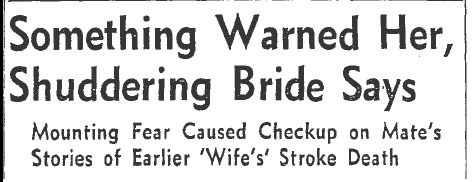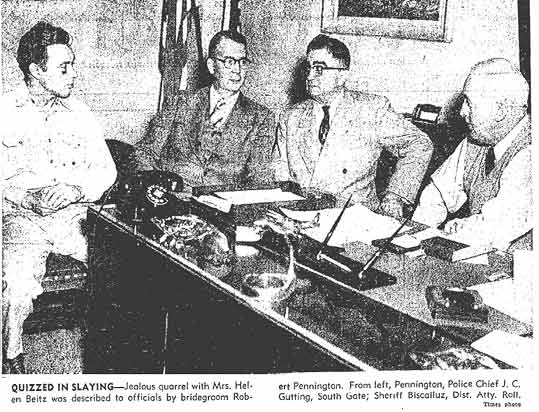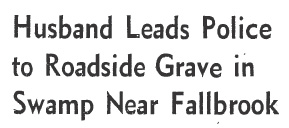 Barbara Eras’ sleuthing had convinced her that her new husband, Robert Pennington, was a liar and possibly a murderer. He had told conflicting stories regarding the whereabouts of his wife, Helen Beitz. Barbara was convinced that something bad had happened to her predecessor, especially after Robert took her to the house he and Helen had shared. As she was giving her statement to the cops, Barbara put her hand to her throat and shuddered; she said:
Barbara Eras’ sleuthing had convinced her that her new husband, Robert Pennington, was a liar and possibly a murderer. He had told conflicting stories regarding the whereabouts of his wife, Helen Beitz. Barbara was convinced that something bad had happened to her predecessor, especially after Robert took her to the house he and Helen had shared. As she was giving her statement to the cops, Barbara put her hand to her throat and shuddered; she said:
“Bobby pins and cosmetics were strewn around. I didn’t think a woman would leave things like this if she was going on away on a visit. In the living room were pictures of her two babies and their little bronzed baby shoes. No mother would go away and leave things like that behind.”
The Sheriffs agreed with Barbara and brought Robert in for questioning. They hammered away at him for three days but he wouldn’t break his silence, so the cops had no choice but to cut him loose for lack of evidence. He may have been released but he wasn’t off the hook, the sheriffs kept him under surveillance.
 When Robert attempted to leave Los Angeles he was arrested again, and this time he broke down and confessed to the murder of Helen Beitz.
When Robert attempted to leave Los Angeles he was arrested again, and this time he broke down and confessed to the murder of Helen Beitz.
As it turned out he and Helen had never even been married, although they’d lived together for a year or so. He told cops that he’d killed her when he found her dressing for a date with another man. The way Robert told the story he’d acted in self-defense, resorting to violence only after Helen had lunged at him with a butcher knife. He said he had grabbed her by the throat to keep her from plunging the knife into him. He choked her until she slumped to the floor. Then he spent more than an hour administering artificial respiration and trying to revive her.
When he realized that Helen was dead, Robert stripped off her clothes and wrapped her nude body in a blanket, placed it in his car and drove south toward Fallbrook. He turned up Mt. Palomar Road, leading to the observatory, then turned onto another road known as Live Oak Park Road. At the bend in the road, at the bottom of a gully, Robert dug a shallow grave and buried her.
Following his confession, he lead deputies to the scene and stood, manacled, between two deputy sheriffs and watched while a bulldozer uncovered Helen’s corpse which had been covered by mud from the January rains.
Barbara Pennington had done a remarkable job of revealing the murder of Helen Beitz, and most women would have been relieved to have emerged from a ten day marriage to a killer unscathed. Barbara was not most women.
She had been advised by an attorney to have her marriage to Robert annuled, but when reporters asked her about it she said:
“I’m not going to get an annulment. I’m going to stick by Bob because he was good to me. And because he was good to my children.”
She went on to say:
“I’ve check up on that women he killed — and she wasn’t much good. I’m sticking by Bob. I’m going to raise all the money I possibly can to defend him. As soon as we get out of this I’m going to remarry him — in the United States.”
Robert’s trial began with Barbara at his side. A couple of women who had met Pennington in a Lynwood bar two weeks before Christmas, and just days after Helen’s murder, testified that he had offered them his dead wife’s clothing. He said that his wife had died several months before from a cerebral hemorrhage.
Following Helen’s death Robert grieved in public, once he had a few drinks in him, but in private he was busy trying to convert Helen’s property into cash for his own use. He even collected one of her paychecks at the paper carton factory in South Gate where he and Helen had worked together.
On April 28, 1952, Robert Pennington was found guilty of second-degree murder and sentenced to from five years to life in San Quentin.
Barbara said:
“I’d wait for him for two years, maybe five years. If he gets more than that, I’d be crazy to wait.”
Barbara may have been a lot of things, but she wasn’t crazy. Two months after Robert’s murder conviction the shuddering bride had her marriage annulled.

![Pennington at grave of Helen Beitz. [Photo courtesy of USC Digital Collection]](https://derangedlacrimes.com/wp-content/uploads/2013/09/pennington-at-grave.jpg)
![Barbara and Robert in court. [Photo courtesy of USC Digital Collection]](https://derangedlacrimes.com/wp-content/uploads/2013/09/penningtons.jpg)
All’s well that ends well. He almost had me believing his story. I hope Barbara found someone nice to marry and had a good life. Always trust your instincts.
Barbara had talked about going back to England with her kids, but I couldn’t find any further info on her. She was definitely an interesting character. You’re right, trust your instincts!
I’m sure glad that Barbara trusted her gut instinct AND came to her senses!
Great blog-as always!
Thanks, Lesley. When I found this case I was hooked and had to tell the story.
this one was a head scratcher…first her intuition kicks in, and she thinks there was something “off” about this guy,turns him in,and decides he wasn’t so bad after all?….the missus sounds equally hopeful,practical,and eccentric …it’s a good thing she didn’t impart all these contradictions to the cops or they would’ve wrote her off as kind of flakey
Devlin, I was surprised by her reaction too. Sort of depressing, but not shocking given the era, that she seems to have felt that the victim was in some way responsible for her own death because she wasn’t a very nice person. Ugh. At least she seems to have snapped to her senses long enough to obtain an annulment.
This story is 100% true? If it is didn’t Helen have kids? What happened to the kids?
Emma,
Yes, the story is absolutely true. One of the reasons I love writing about true crime is that it can be far stranger than fiction.
As far as I can tell, Helen had a son in 1942, but I don’t know who raised him after her death. He may have gone to her family in
Oklahoma. The son, Dennis, passed away in 1997.
Best,
JOan